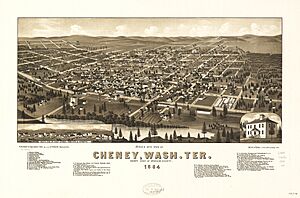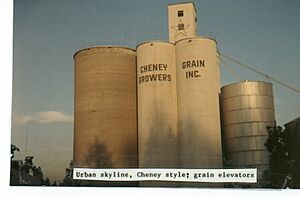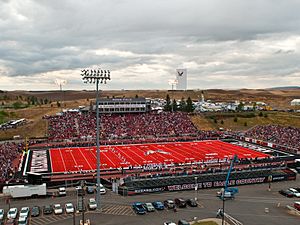Cheney, Washington facts for kids
Quick facts for kids
Cheney, Washington
|
|
|---|---|
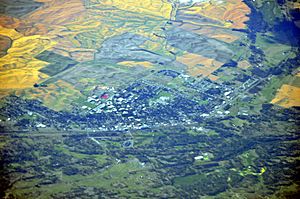
Aerial view of Cheney, Washington, 2013
|
|
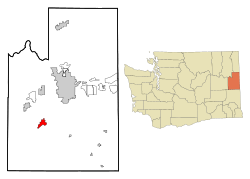
Location of Cheney, Washington
|
|
| Country | United States |
| State | Washington |
| County | Spokane |
| Named for | Benjamin Pierce Cheney |
| Government | |
| • Type | Mayor-Council/Strong Mayor |
| Area | |
| • Total | 4.37 sq mi (11.32 km2) |
| • Land | 4.34 sq mi (11.25 km2) |
| • Water | 0.03 sq mi (0.08 km2) |
| Elevation | 2,352 ft (717 m) |
| Population
(2020)
|
|
| • Total | 13,255 |
| • Density | 3,052.7/sq mi (1,178.7/km2) |
| Time zone | UTC-8 (Pacific (PST)) |
| • Summer (DST) | UTC-7 (PDT) |
| ZIP code |
99004
|
| Area code | 509 |
| FIPS code | 53-11825 |
| GNIS feature ID | 1531416 |
Cheney (pronounced CHEE-nee) is a city in Spokane County, Washington, United States. In 2020, about 13,255 people lived there. Cheney is also home to Eastern Washington University (EWU). When students are attending classes, the city's population grows to around 17,600 people!
Contents
History of Cheney, Washington
Cheney was officially started on November 28, 1883. It was named after Benjamin Pierce Cheney, a rich railroad businessman from Boston.
The city of Cheney is in Spokane County. It's known for its small-town feel. This feeling is made even better by the many students from Eastern Washington University. This university has over 10,000 full-time students. The Seattle Seahawks football team used to hold their summer training camps at EWU from 1976 to 1985, and again from 1997 to 2006.
Cheney grew into the city it is today because of its strong connections to education, trail riding, and farming. This helped the community's economy. The area became settled after 1858, when the last major Native American defense happened in Eastern Washington. Settlers started building homes in the late 1860s and early 1870s. They were drawn by plenty of water, timber, and the promise of a railway line. They settled near some springs where the Burlington Northern train station now stands.
The community had a few different names over time. First, it was called Section Thirteen, then Willow Springs, then Depot Springs (because of the railroad). It was also called Billings for a short time, after a president of the Northern Pacific Company. Finally, it was named Cheney, Washington, to honor Benjamin Pierce Cheney, who was a director of the Northern Pacific Railroad.
Benjamin P. Cheney was born in 1815 in Hillsborough, New Hampshire. When he was 16, he started working as a stagecoach driver. Later, he became a stage agent in Boston. He then created a company called the United States and Canada Express Company. Many years later, this company joined with American Express. Benjamin P. Cheney became the largest owner of American Express shares. He only visited the town of Cheney once, on September 18, 1883. This was after the "Last Spike Ceremony," which connected the eastern and western parts of the railroad. Benjamin Cheney gave money to start the Benjamin P. Cheney Academy in the town. The railroad also gave 8 acres of land for the school. In 1880, the railroad tracks were laid through the town. In 1883, the town was officially formed. Its streets were laid out in a triangle shape, with the base parallel to the tracks.
After some changes, Spokane County needed to choose a permanent county seat (the main city for county government). Cheney and Spokane Falls (now Spokane) both wanted this honor. Cheney seemed to win the vote, but there were claims of problems with the election. Spokane Falls was declared the winner.
The people of Cheney decided to take action! One night, when most people in Spokane Falls were at a big wedding party, a group of armed "Cheneyites" went to the Auditor's office. They took the official books, counted the votes themselves, and found that Cheney had actually won. Then, they left with the records in the dark! This event, called the "Grand Steal," was not challenged much and was confirmed by a court in 1881.
Cheney remained the county seat until 1886. By then, Spokane Falls was growing much faster. They held another vote and Spokane Falls won back the county seat. From then on, Cheney's history focused on the growth of its college. This college was first called the State Normal School, then Eastern Washington College of Education, then Eastern Washington State College, and finally Eastern Washington University. Cheney was very determined to build and promote its college. This was partly to regain the importance it lost when it was no longer the county seat.
When Washington became a state in 1889, Cheney was able to get a law passed to establish one of the state's normal schools (schools for training teachers) in Cheney. Their best argument was that they already had the start of a normal school with the Benjamin P. Cheney Academy.
Over the next 25 years, there were disagreements about funding for the normal school. But each time, the people of Cheney found ways to raise money to keep the college open until the next time the state legislature met. The growth of the Cheney Normal School and the change of the frontier land into a busy community helped change attitudes in the area. Women on the frontier played a big role in creating the small community feel. They used their energy to create a good lifestyle for the young people.
The Battle of Four Lakes
The Battle of Four Lakes was an important fight during the Coeur d'Alene War in 1858. This war took place in what was then the Washington Territory. Today, this area includes parts of the states of Washington and Idaho. The Coeur d'Alene War was actually a part of a bigger conflict called the Yakima War, which started in 1855.
This battle happened near a place now known as Four Lakes, Washington. It was fought between the United States Army and a group of Native American tribes. These tribes included the Schitsu'umsh (Coeur d'Alene), Palus, Spokan, and Yakama warriors.Geography and Climate
Cheney is located at 47°29′19″N 117°34′43″W / 47.48861°N 117.57861°W. It sits high up, at an elevation of about 2,352 feet (717 meters).
Cheney is the highest point on the railroad lines between Spokane and Portland. It's on the easiest path from the Spokane Valley to the Columbia Plateau. This is why it grew so much early on with the railroads. The town is built on rolling Palouse hills. It overlooks the Channeled Scablands to the south and east. These scablands were carved out by huge, ancient floods called the Missoula Floods. Today, these areas have "pothole" lakes and wetlands. They are also home to the Turnbull National Wildlife Refuge. There are many lakes, plus the Spokane River and Little Spokane River, within 20 miles (32 km) of Cheney. These offer lots of fun activities like boating, swimming, water skiing, and fishing.
The United States Census Bureau says that Cheney covers about 4.30 square miles (11.14 sq km). Most of this is land, with a small amount of water.
Nearby cities and towns
Climate in Cheney
Cheney is on the edge of a dry area that leads up to the Selkirk Mountains. Summers here are hot and dry. Winters are cold, wet, and windy.
| Climate data for Cheney | |||||||||||||
|---|---|---|---|---|---|---|---|---|---|---|---|---|---|
| Month | Jan | Feb | Mar | Apr | May | Jun | Jul | Aug | Sep | Oct | Nov | Dec | Year |
| Record high °F (°C) | 60 (16) |
64 (18) |
72 (22) |
89 (32) |
93 (34) |
105 (41) |
107 (42) |
101 (38) |
109 (43) |
90 (32) |
75 (24) |
73 (23) |
109 (43) |
| Mean daily maximum °F (°C) | 33.9 (1.1) |
40.8 (4.9) |
49.2 (9.6) |
61.6 (16.4) |
69.4 (20.8) |
76.2 (24.6) |
86.6 (30.3) |
83.9 (28.8) |
75.5 (24.2) |
61.5 (16.4) |
45.5 (7.5) |
36.9 (2.7) |
60.1 (15.6) |
| Mean daily minimum °F (°C) | 19.8 (−6.8) |
23.6 (−4.7) |
27.8 (−2.3) |
33.9 (1.1) |
40.3 (4.6) |
45.7 (7.6) |
51.9 (11.1) |
50.7 (10.4) |
45.5 (7.5) |
36 (2) |
28.3 (−2.1) |
23.8 (−4.6) |
35.6 (2.0) |
| Record low °F (°C) | −35 (−37) |
−29 (−34) |
−4 (−20) |
14 (−10) |
21 (−6) |
26 (−3) |
31 (−1) |
30 (−1) |
25 (−4) |
14 (−10) |
4 (−16) |
−6 (−21) |
−35 (−37) |
| Average precipitation inches (mm) | 2.27 (58) |
1.8 (46) |
1.37 (35) |
1.06 (27) |
1.51 (38) |
1.41 (36) |
0.57 (14) |
0.46 (12) |
0.98 (25) |
1.5 (38) |
2.37 (60) |
2.21 (56) |
17.51 (445) |
| Average snowfall inches (cm) | 14 (36) |
8.4 (21) |
3.6 (9.1) |
0.4 (1.0) |
0 (0) |
0 (0) |
0 (0) |
0 (0) |
0 (0) |
0.4 (1.0) |
3.7 (9.4) |
11.8 (30) |
42.4 (108) |
| Average precipitation days (≥ 0.01 inch) | 13 | 10 | 9 | 7 | 7 | 7 | 3 | 3 | 4 | 7 | 11 | 11 | 92 |
Life in Cheney
Downtown Area
Cheney's Historic Downtown is about four blocks from the EWU campus. It has a mix of shops, services, and government offices. In the past, EWU, the City of Cheney, and downtown businesses worked together to improve the area.
Today, downtown Cheney is a "university district." It hosts many community festivals and a farmers' market. Many businesses there serve the college students.
Downtown Cheney is also home to the Cheney Historical Museum. This museum collects and shares information and items about the history of the area. Volunteers open the museum at different times and for appointments. They also do research and care for the collection.
The downtown area is also a starting point for the Columbia Plateau Trail and the Fish Lake Trail. These trails let you explore the unique landforms created by the ancient Great Ice Age Floods.
Fairchild Air Force Base
Fairchild Air Force Base is about 7 miles (11 km) north of Cheney. It was built in 1942 and is a very important part of the U.S. defense. Many people who work at the base live in Cheney.
Over the years, Fairchild Air Force Base has changed its role. It started as a repair center during World War II. During the Cold War, it was a base for bomber planes. Today, it's a key base for the Air Force's planes that refuel other planes in the air.
Fairchild Air Force Base is also the main training center for Survival, Evasion, Resistance, and Escape (SERE) techniques. SERE is a U.S. military program that teaches service members how to survive, avoid capture, and deal with being a prisoner. It was created by the U.S. Air Force and later expanded to the U.S. Army and U.S. Navy. The SERE school at Fairchild AFB trains aircrews, special forces, and others who work in dangerous areas where they might be captured.
Population and People
| Historical population | |||
|---|---|---|---|
| Census | Pop. | %± | |
| 1890 | 647 | — | |
| 1900 | 781 | 20.7% | |
| 1910 | 1,207 | 54.5% | |
| 1920 | 1,252 | 3.7% | |
| 1930 | 1,335 | 6.6% | |
| 1940 | 1,551 | 16.2% | |
| 1950 | 2,797 | 80.3% | |
| 1960 | 3,173 | 13.4% | |
| 1970 | 6,358 | 100.4% | |
| 1980 | 7,630 | 20.0% | |
| 1990 | 7,723 | 1.2% | |
| 2000 | 8,832 | 14.4% | |
| 2010 | 10,590 | 19.9% | |
| 2020 | 13,255 | 25.2% | |
| U.S. Decennial Census | |||
In 2010, there were 10,590 people living in Cheney. The city had 3,902 households. About 81.7% of the people were White, 4.0% African American, 1.3% Native American, and 4.0% Asian. About 9.3% of the population was Hispanic or Latino.
The average age in Cheney in 2010 was 22.3 years old. This is quite young, partly because of the university students. About 14.7% of residents were under 18. A large group, 48.6%, were between 18 and 24 years old.
Economy and Jobs
Cheney used to be a busy railroad town and the county seat. Now, it's mostly a "bedroom community" for Spokane. This means many people who live in Cheney work and shop in Spokane. Also, more than half of the students at Eastern Washington University travel to Cheney for classes every day.
Eastern Washington University is the biggest employer in Cheney. After that comes the Cheney School District and the city government. In the private sector, healthcare provides many jobs. Farming and agriculture are also very important. Farmers mainly grow dryland grains like wheat, barley, and peas, along with a lot of hay.
Cheney is only about 15 miles (24 km) southwest of Spokane. Because Spokane is growing, Cheney has also seen a lot of growth since the mid-1990s. Much of this growth has happened in the northern part of the city, near Interstate 90. I-90 is the main road between Cheney and Spokane. This area has gained new businesses and restaurants, including a shopping center with a supermarket. The city has also seen more homes built, with new apartments and housing areas.
The city hopes to attract more businesses and technology companies. They are installing a fiber-optic network to connect all businesses. They are also developing a technology business park. The city has recently started making its historic downtown look nicer. They also built a walkway just for people to walk between downtown and the university.
Eastern Washington University is one of the fastest-growing universities in Washington state. Many new buildings have been built or updated on campus. The campus has also been made more beautiful. A new student dorm was built, and the football stadium was renovated.
Cost of Living
The cost of living in Cheney is generally a bit lower than the average for the United States. For example, if the US average is 100, Cheney's overall cost of living is 94. This means it's a bit cheaper to live there.
| Cost of living component | Cheney | United States average |
|---|---|---|
| Overall | 94 | 100 |
| Food | 105 | 100 |
| Utilities | 75 | 100 |
| Miscellaneous | 106 | 100 |
The average cost for a home in Cheney is about $202,400.
Fun Things to Do
Cheney Rodeo Days
Cheney Rodeo Days is a big event held every year on the second weekend of July. It has been happening since 1967! The event includes three days of rodeo competitions. There's also a fun run and a parade through downtown Cheney. The rodeo offers over $40,000 in prize money. It's a professional rodeo event, meaning cowboys can compete to qualify for bigger championships.
Cheney Farmers' Market
The Cheney Farmers' Market happens every Saturday from June 1 to September 14. It's located downtown. You can find many locally grown foods and handmade items from local artists. The market helps people meet local farmers and learn where their food comes from.
Washington State Archives
Cheney is home to the Eastern Regional Branch of the Washington State Archives. This place keeps old government records and helps manage new ones for many counties in Eastern Washington. These records include things like school census lists, tax rolls, court documents, photos, and maps. They help us learn about the history of the area. The Archives building is on the campus of Eastern Washington University.
Parks and Outdoor Fun
The City of Cheney has many nice public parks. There are currently seven parks within the city limits. More land is set aside for two new parks to help with Cheney's recent growth. The current parks are:
- City Park: Has picnic areas, barbecue grills, playground equipment, and restrooms.
- Centennial Park: Has two soccer fields, picnic areas, and a horseshoe pit.
- Hagelin Park: Has picnic areas, playground equipment, restrooms, an outdoor swimming pool, tennis courts, volleyball courts, and soccer fields.
- Hibbard Park: Has a basketball court and playground equipment.
- Moos Field: Has two baseball fields, a soccer field, and restrooms.
- Salnave Park: Has two soccer fields, two softball fields, a baseball field, playground equipment, a basketball court, tennis courts, restrooms, and picnic areas.
- Sutton Park: Has playground equipment, restrooms, and a gazebo.
Local Recreation Programs
Cheney offers many recreation programs. These are run by the city, county, and local non-profit groups. Activities include basketball, baseball, softball, gymnastics, karate, day camps, and arts & crafts for kids. There are also sports leagues for adults and trips for senior citizens. During the summer, Sutton Park hosts concerts and movie nights. Some non-profit groups that offer programs are:
- Cheney Waves Aquatic Team (swimming)
- Cheney Cooperative Preschool
- Cheney Storm Soccer Club
- West Plains Little League Association (baseball/softball)
- Spokane Youth Sports Association (soccer and baseball)
- Hunter Safety Courses
- Boy Scouts / Girl Scouts
Columbia Plateau Trail State Park
The Columbia Plateau Trail is a very long path in Eastern Washington. It stretches for 130-mile-long (210 km) and is 20-foot-wide (6.1 m). This trail is part of the Washington State Park system.
The trail follows an old railroad line. This line used to belong to the Spokane, Portland and Seattle Railway. It goes from Cheney all the way to where the Snake River and Columbia River meet near Pasco, Washington. It passes through five different counties.
Most of the trail is made of gravel. However, a 3.75 miles (6.04 km) part near Cheney and Fish Lake is paved. You can do many fun activities on the trail. These include hiking, mountain biking, and horseback riding. You can also use in-line skates on the paved parts. It's also a great place to watch wildlife. Because the paved part is close to an active railroad, some people enjoy watching trains there. This is called railfanning.You can get onto this trail from four spots near Cheney. The part between Fish Lake and Cheney is paved, which is great for biking or walking. The rest of the trail is gravel.
Turnbull National Wildlife Refuge
The Turnbull National Wildlife Refuge is a special natural area in Spokane County, northeastern Washington. It's about 6 miles (10 km) south of Cheney, Washington. This refuge covers over 18,000 acres (7,284 hectares) of land known as the Channeled Scablands.
Turnbull NWR is a unique place. It has a mix of rocky areas, deep canyons, and ponderosa pine forests. You'll also find more than 130 marshes, wetlands, and lakes here. This mix creates a beautiful home for many types of wildlife. The refuge is named after Cyrus Turnbull, who lived in this area in the 1880s.Nearby Outdoor Activities
There are many fun things to do near Cheney:
- Golf at the Fairway's Golf Course, about 5 miles (8 km) northwest of Cheney. It's an 18-hole course.
- Lilac Bloomsday Run is a 7.46-mile (12 km) road race in Spokane every May. It's one of the biggest road runs in America, with over 60,000 people participating!
- Spokane Hoopfest is the world's largest 3-on-3 outdoor basketball tournament. It happens every June in downtown Spokane. About 6,000 teams and over 24,000 players join in!
- Snow skiing is available at four different ski areas nearby: Mount Spokane Ski and Snowboard Park, 49 Degrees North, Schweitzer Mountain, and Silver Mountain, Idaho.
- Whitewater rafting, kayaking, and hiking at Riverside State Park. This park is about 10 miles (16 km) east of Cheney. It has unique rock formations along the Spokane River, perfect for rafting and rock climbing.
Education in Cheney
Cheney School District
The public schools in Cheney are managed by the Cheney School District. The district spends about $5,688 per student each year. This is a bit less than the national average. In Cheney public schools, there are usually about 25-35 students per teacher. The district runs seven schools and also has a program for K-8 homeschool students.
Eastern Washington University
Eastern Washington University (EWU) started in 1882 as the Benjamin P. Cheney Academy. Over 200 students enrolled when it first opened.
In 1889, the same year Washington became a state, the academy became the Washington State Normal School at Cheney. By 1937, it was called Eastern Washington College of Education. It was a fully recognized four-year college, offering many different subjects. The campus and its programs grew quickly after World War II. In 1961, it changed its name again to Eastern Washington State College. It was clear that the region needed professionals in many areas, so Eastern added many new degree programs. Finally, in 1977, the state legislature changed the school's name to Eastern Washington University.
Today, Eastern Washington University is a large public university. It also offers programs in other cities like Spokane, Seattle, and Bellevue.
Libraries
Cheney has two libraries:
- Cheney Library is a public library. It's part of the Spokane County Library District, which has 10 libraries. This district has over 400,000 items you can borrow.
- John F. Kennedy Library is at Eastern Washington University. It's a research library with many resources for university students and teachers. It also helps the surrounding communities.
City Services
Healthcare
Cheney has two medical clinics and four dentists for local healthcare needs. For hospital and surgical services, residents go to the three major hospitals in Spokane.
Transportation
Main Roads
- Interstate 90
- U.S. Route 2
- U.S. Route 195
- State Route 904 (also known as the Lt. Col. Michael P. Anderson Memorial Highway)
Airports
- Spokane International Airport: This airport is about 10 miles (16 km) northeast of Cheney. It serves many major airlines and cargo companies.
- Felts Field: This is a smaller airport in Spokane, about 25 miles (40 km) northeast of Cheney. It's used for general aviation, like private planes.
Public Transportation
- Spokane Intermodal Center: This is a combined train and bus station in downtown Spokane, about 16 miles (26 km) northeast of Cheney. You can catch Amtrak trains or Greyhound buses here.
- Public bus service is provided by the Spokane Transit Authority. They have three bus routes that serve Cheney and connect it to other places in the region. They also offer special services for people with disabilities.
Famous People from Cheney
- Lt. Col. Michael P. Anderson (1959–2003): An astronaut who sadly passed away during the Space Shuttle Columbia disaster in 2003.
- Steve Emtman (born 1970): A former football player who played for several National Football League teams.
- Linda Johns (born 1960): An author known for her children's mystery series.
- Clarence D. Martin (1886–1955): Served as the governor of Washington state from 1933 to 1940.
- Launi Meili (born 1963): An Olympic gold medalist in rifle shooting at the 1992 Olympics. Signs at the city entrances honor her achievement!
- Dallas Peck (1929–2005): A famous geologist and expert on volcanoes. He was the Director of the U.S. Geological Survey from 1981–1993.
- Todd McFarlane (born 1961): A well-known comic book artist and writer. He worked on comics like The Incredible Hulk and The Amazing Spider-Man before starting his own company, Image Comics.
Historic Places in Cheney
Many places in Cheney are listed on the National Register of Historic Places. This means they are important historical sites.
| Site | Image | Listing Date | Address | Ref# | Notes |
|---|---|---|---|---|---|
| Cheney Interurban Depot |  |
Mar 26, 1979 | 505 2nd St | 79002555 | aka Cheney Care Center |
| Cheney Odd Fellows Hall |  |
Oct 25, 1990 | 321 First St | 90001639 | |
| City of Cheney Historic District |  |
Feb 2, 2001 | bounded by 5th, C, Front, and F streets | 01000062 | |
| Dybdall Gristmill | Jan 11, 1976 | 10 mi (16 km) south of Cheney at Chapman Lake | 76001913 | aka Chapman Lake Mill | |
| Italian Rock Ovens | Sep 29, 1976 | south of Cheney in Turnbull NWR | 76001914 | ||
| David Lowe House |  |
Oct 13, 1983 | 306 F St | 83004264 | |
| Sutton Barn |  |
Nov 20, 1975 | 1⁄2 mi (0.80 km) southwest of Cheney off U.S. 395 | 75001871 | aka Red Barn |
| Turnbull Pines Rock Shelter | May 6, 1975 | Restricted | 75001872 | Period of Significance: 1499-1000 AD, 1800–1824, 1825–1849, 1850–1874, 1875–1899 | |
| Upper Kepple Rockshelters (45SP7) | Jul 26, 1985 | Restricted | 85001640 | ||
| Washington State Normal School at Cheney Historic District |  |
Oct 1, 1992 | Jct. of 5th and C streets | 92001287 | aka Eastern Washington University Historic District |
See also
 In Spanish: Cheney (Washington) para niños
In Spanish: Cheney (Washington) para niños
 | Frances Mary Albrier |
 | Whitney Young |
 | Muhammad Ali |


